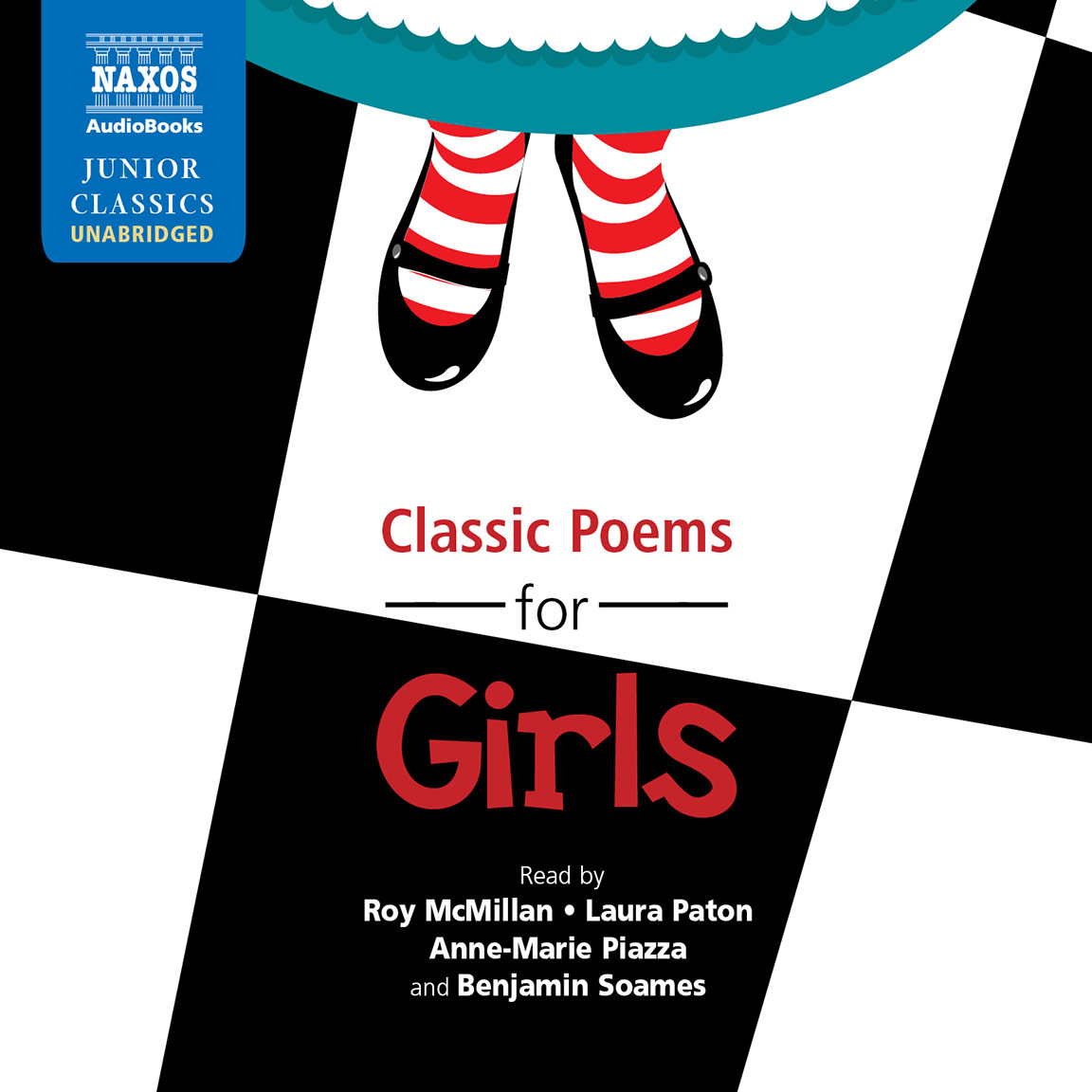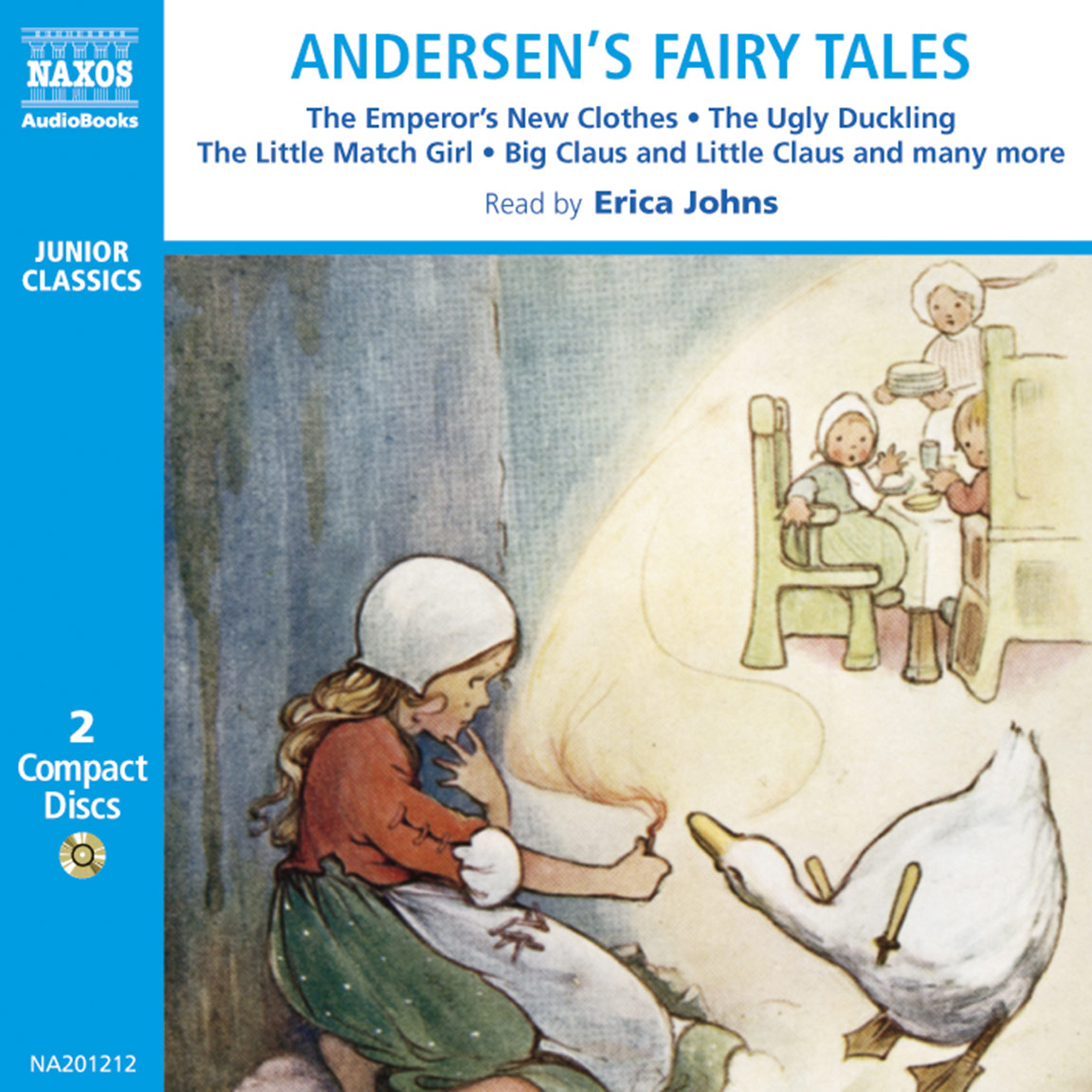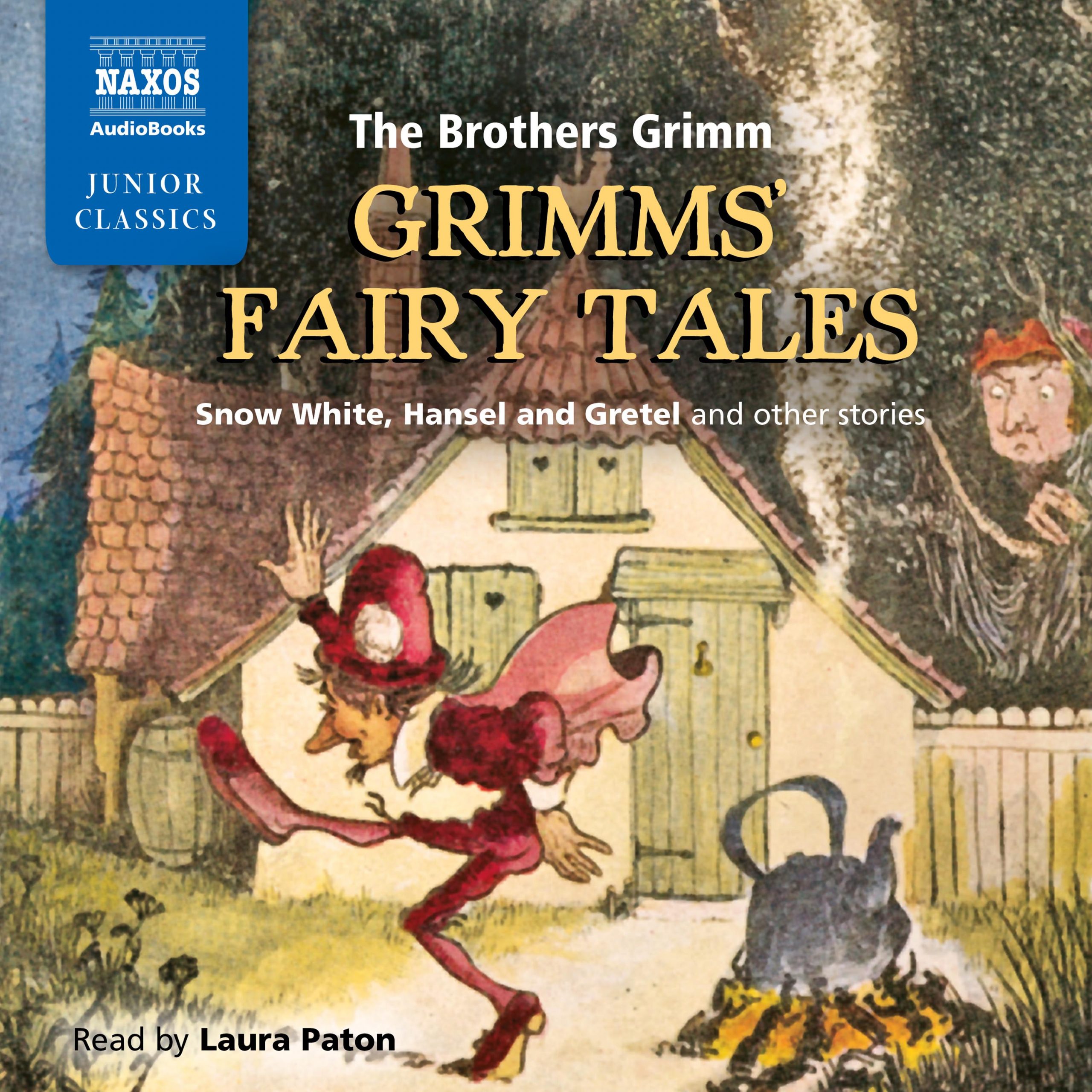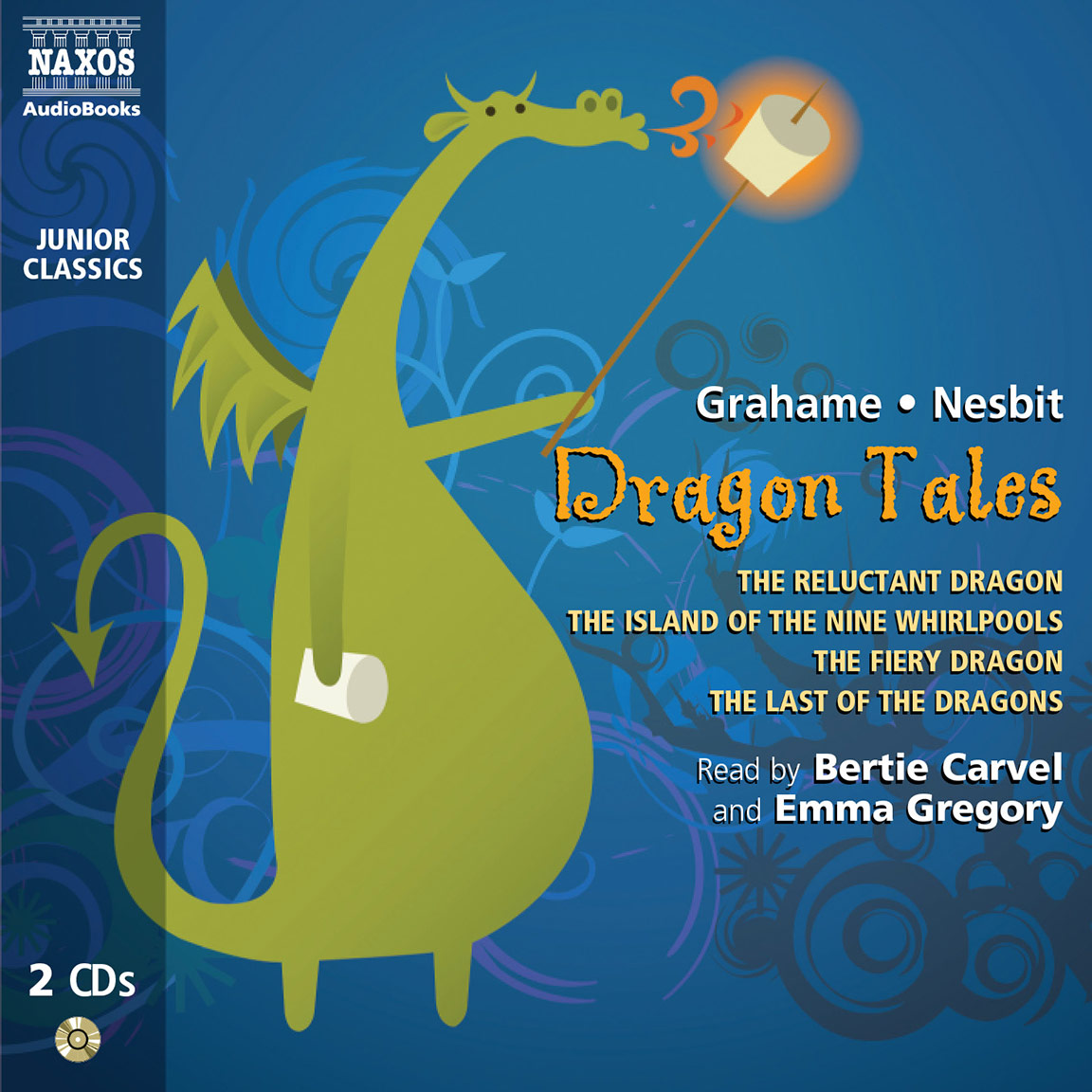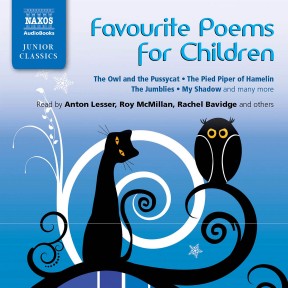
Audio Sample
Various
Favourite Poems for Children
Read by Anton Lesser, Roy McMillan, Rachel Bavidge, Katinka Wolf, Richard Wilson, David Timson, Anne Harvey, Simon Russell Beale & Timothy West
selections
Dance with a lobster, telephone an elephant or knock on a moonlit door – this collection includes magical, macabre, dramatic, funny, bizarre, absurd, delightful, moving and charming poems by Lewis Carroll, A.A. Milne, Edward Lear, Hilaire Belloc, Kenneth Grahame and many others. Readers such as Anton Lesser, Simon Russell-Beale and Timothy West bring the lines beautifully to life and make this an ideal introduction to some of the best-loved children’s poetry.
-
Running Time: 1 h 14 m
More product details
Digital ISBN: 978-1-84379-424-0 Cat. no.: NA0013 Download size: 18 MB BISAC: JUV070000 Released: September 2010 -
Listen to this title at Audible.com↗Listen to this title at the Naxos Spoken Word Library↗
Due to copyright, this title is not currently available in your region.
You May Also Enjoy
Included in this title
- Lewis Carroll
- The Lobster Quadrille
- Lewis Carroll
- The Walrus and the Carpenter
- Lewis Carroll
- You Are Old, Father William
- Lewis Carroll
- Humpty Dumpty’s Song
- Lewis Carroll
- Jabberwocky
- John Clare
- Little Trotty Wagtail
- James Reeves
- The Bogus-Boo
- Oliver Herford
- A Tragedy in Rhyme
- Anonymous
- A Guinea Pig Song
- Edward Lear
- The Jumblies
- Edward Lear
- The Owl and the Pussycat
- Kenneth Grahame
- Duck’s Ditty
- Edward Lear
- There was an Old Man with a Beard
- John Keats
- Old Meg
- Edward Lear
- How Pleasant to Know Mr Lear
- John Keats
- There was a naughty boy
- William Makepeace Thackeray
- At the Zoo
- Anonymous
- Dahn the Plug’ole
- Hilaire Belloc
- Henry King
- Hilaire Belloc
- Matilda
- A.A. Milne
- The King’s Breakfast
- Anonymous
- There was a little girl
- William Cowper
- The Snail
- Anonymous
- Framed in a First-Storey Winder
- Anonymous
- There was a man of double deed
- Sarah Catherine Marine
- The Comic Adventures of Old Mother Hubbard and Her Dog
- Charles Causley
- Colonel Fazackerly
- William Brighty Rands
- Topsy-Turvey World
- Walter de la Mare
- The Listeners
- William Blake
- The Tyger
- Anonymous
- The Ballad of Sir Patrick Spens
- Robert Louis Stevenson
- Bed in Summer
- Robert Louis Stevenson
- Time to Rise
- Robert Louis Stevenson
- My Shadow
- Thomas Hardy
- Wagtail and Baby
- Anonymous
- Two Little Kittens
- Rudyard Kipling
- If
- Laura Richards
- Eletelephony
- Robert Browning
- The Pied Piper of Hamelin
- Robert Browning
- Into the street the Piper stepped…
- Robert Browning
- The mayor was dumb, and the council stood…
Reviews
Thirty-nine poems by English authors range in length from 15 seconds to about 16 minutes. Many will be familiar titles: Jabberwocky, The Jumblies, The Owl and the Pussycat, Old Mother Hubbard, The Tyger, The Ballad of Sir Patrick Spens, If, and The Pied Piper of Hamelin. The authors of the 39 poems include Lewis Carroll, Edward Lear, John Keats, William Thackeray, Hilaire Belloc, A. A. Milne, Walter de la Mare, William Blake, Robert Louis Stevenson, Thomas Hardy, Rudyard Kipling, Robert Browning, and the prolific Anonymous. The readers/presenters are British actors of note and include Anton Lesser, Roy McMillan, Rachel Bavidge, Katinka Wolf, Richard Wilson, David Timson, Anne Harvey, Simon Russell Beale, and Timothy West. Their presentations are excellent, bringing to life the bizarre, the mysterious, the humorous. The walrus and carpenter weep even as they devour the compliant oysters. Humpty Dumpty sings of little fishes. The Bogus-Boo comes out at night with his six ears and eight paws. The Jumblies go to sea in a sieve. Both the rats and the children of Hamelin are piped away. And a Cockney accent ’elps the baby go dahn the plug ’ole. This is a wonderful introduction to familiar British verse which will delight children on both sides of the pond.
Janet Julian, soundcommentary.com
Favourite Poems for Children introduces them to such delights as My Shadow, The Listeners, The Pied Piper of Hamelin and many more, and readers include Simon Russell Beale, Timothy West and Anton Lesser. Another bedtime must!
Kati Nicholl, Daily Express
The 39 poems here are classics of imagination and whimsy, alive with the great and mysterious power that language exercises over childhood. With a couple of exceptions, the poets are British, and their verses are suffused with the golden aura of childhood’s halcyon days. All but one of the nine readers here are professional actors. The poems range in mood from the the stirring potency of William Blake’s The Tyger, magnificently read by Timothy West, to the inspired high jinks of Lewis Carroll’s and Edward Lear’s nonsense poems, and the linguistic confusion of Laura Richard’s Eletelephony. There are adventuresome pieces, such as The Ballad of Sir Patrick Spens, read with intoxicating Scots brio by Anton Lesser, and many tales of busy doings. Interspersed throughout are passages of classical music. This is a recording for your permanent collection.
Katherine A. Powers, The Washington Post
Booklet Notes
Poetry has a special magic. Words are remarkable things anyway (they often have completely different meanings depending on how they’re used, for example) but with poems there are extra ingredients.
Rhythm and rhyme – sometimes both together, sometimes on their own – are what make poetry.
It’s not just the fact that the lines don’t reach the edge of the page (though that helps). It’s about how they sound in your head and in your ear and, when you start saying them yourself, in your mouth.
Writers naturally hear the words themselves when they create the poems, which is why they often sound so good when they’re read out loud; and it is the right rhythm and the best rhyme that makes their poems so funny, or weird, or touching, or sad, or dramatic, or whatever it is they are trying to create.
The stories that are being told are often interesting enough in themselves – like The Pied Piper of Hamelin, for instance, which is really quite a scary tale about kidnapping a village-full of children.
But something different happens when it gets turned into verse. You get carried along by the rhythm, and your ear starts listening for the rhymes. And that’s when the magic seems to happen. The rhythm sets it up, and gives you a guide to the style and feel of the poem. Take the first lines of these two poems, for example:
The Listeners
‘Is there anybody there?’ said the Traveller,
Knocking on the moonlit door;
And his horse in the silence champed the grasses
Of the forest’s ferny floor:
Matilda
Matilda told such Dreadful Lies,
It made one Gasp and Stretch one’s Eyes;
Her Aunt, who, from her Earliest Youth,
Had kept a Strict Regard for Truth,
Attempted to Believe Matilda:
The effort very nearly killed her,
In the first one, the atmosphere is set up immediately with that opening question and that rather mysterious ‘Traveller’ (where from? Where to?); and the fact that it’s at night makes it a bit eerie, too.
Then there’s the rhythm. It doesn’t allow you to just bounce through the words – you have to slow down a bit: ‘And his horse in the silence champed the grasses’ requires a little bit of careful mouth-work to say it. This adds to the sense of drama in itself, as does the information that it’s so quiet, you can hear the horse munching the grass. Except it’s ‘champing’, not munching – munching sounds too cheerful. Champing suggests discomfort, eagerness to get away.
In the second poem, you’re laughing almost before you realise why. The immediacy of it, the speed of the rhythm and that quick rhyme all work together to create little punchlines. You know the beat of the poem immediately, and you know there’s a rhyme coming any second, and the chances are it’ll be funny.
Rhyming ‘Matilda’ with ‘killed her’ would probably get a laugh anyway, but when it’s added to the rather snooty-sounding Aunt, it’s not just funny but clever. You don’t expect to hear an expression like that about someone who ‘had kept a Strict Regard for Truth’ (Belloc uses capitals to make the point about how Very Proper this Aunt is). All this makes the line even funnier, but it’s driven by the swift, short lines, and their rhythmic effect. Then there is the rhyme.
There doesn’t seem to be any logic in the idea – after all, just because one word sounds like another it shouldn’t make any difference. But it does. The rhymes seem to connect the words somehow, in a fashion that is not necessarily about the meaning.
This has quite a few different effects. First is the expectation. Whether you like it or not, if a poem has a strong rhythm and rhyme, you will start to expect the rhyme word. What could he rhyme with ‘Matilda’?
Before you have a chance to run through the options, you find out what it is; and the surprise and delight of it makes you laugh, especially because of the way it makes sense – not just that it has the same noise as the first word. But somehow the fact that it does, indeed, sound much the same as the first word adds to the pleasure of it.
(Some poems deliberately don’t rhyme things exactly, because the writers know that you can’t help expecting the rhyme; and when it doesn’t happen, it can have a slightly unsettling effect).
Once you realise that there is a connection, and expectation, then rhyme has another neat trick. It makes things memorable. It seems to work the way magnets do – one of them attracts the other. So if you have a word like ‘door’, your mind seems to find it much easier to remember that the word ‘floor’ is on the way. This makes filling in the bits in between easier, too; as does the rhythm, which sticks in your mind the way a tune does.
Poetry also allows you to do things that you can’t always do with other kinds of writing. In The Tyger (which is just an old-fashioned way of spelling ‘tiger’), the poet starts with:
Tyger! tyger! burning bright
In the forests of the night
What on earth does he mean? A burning tiger in a forest at night… well, not quite. To start with, it’s a forest of the night, which is a strange but compelling idea. Does the night have forests? Or is it just that the night is dark and frightening, and then forests are also dark and frightening, which means combining the two would be so much more frightening and dark.
And that ‘burning’ – he doesn’t really mean on fire, surely; so maybe it’s about the extraordinary colours of the tiger’s skin, those oranges and blacks, being like flames; and bright flames, too, despite the extra layers of darkness. Whether or not the image makes logical sense, it’s fascinating, powerful and pretty much unforgettable. See whether you can ever look at a tiger again without thinking
of it.
With powerful images, extraordinary ideas, humour, drama, rhythms, rhymes, expectations and all kinds of other tricks (alliteration, assonance, paradox, opposition – there are loads – you’ll have to look them up in a dictionary if you don’t know them already), poetry works hard to get into your head and stay there.
It does this just the way that music does, creating hooks and links and ideas and pictures that stay with you
forever. Poems are relatively easy to learn – you know the lyrics to most of your favourite songs, after all.
What’s more, if you take a little time to learn the ones you like, you’ll never be stuck trying to remember that funny bit when you tell your friends (which can be really annoying). You can have something you know is well-written to hand whenever it’s needed (the next time you see an elephant in a telephone box, you’ll have just the thing). But most importantly, there are
wonderful poems; why not have something wonderful with you whenever you want it?
Notes by Roy McMillan

